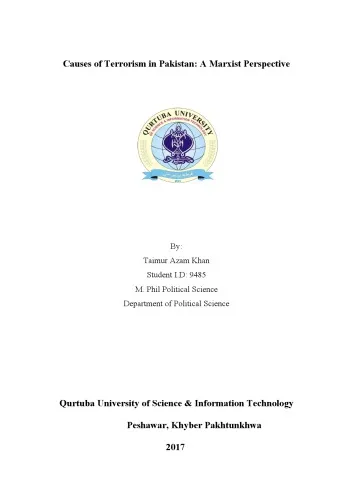Causes of Terrorism in Pakistan: A Marxist Perspective
3.8
Reviews from our users

You Can Ask your questions from this book's AI after Login
Each download or ask from book AI costs 2 points. To earn more free points, please visit the Points Guide Page and complete some valuable actions.Related Refrences:
Introduction
Causes of Terrorism in Pakistan: A Marxist Perspective delves deep into the historical, political, economic, and ideological roots of terrorism within Pakistan, using a Marxist lens to dissect the systemic and structural causes of this persistent crisis. Written in a time when global discourse on terrorism is often dominated by rhetoric rather than substantive analysis, this book aims to untangle the web of socio-economic inequalities, imperialist interventions, and class struggles that have contributed to Pakistan's troubled landscape. By aligning historical materialism with modern socio-political narratives, the book provides a thought-provoking framework to understand a deeply complex and harrowing issue.
Terrorism in Pakistan is often presented as a religious or cultural issue by mainstream analyses, but this book challenges that limited perspective. Instead, it strives to offer a comprehensive understanding by addressing how capitalism, class stratification, feudal power structures, foreign imperialism, and the contradictions of the state have fueled the flames of extremism. By addressing both domestic and international dimensions, this book gives readers a critical understanding of the phenomena through rigorous analysis and progressive inquiry.
Summary of the Book
Causes of Terrorism in Pakistan: A Marxist Perspective is divided into several chapters that explore terrorism not as an isolated event but as the outcome of broader systemic issues. From the legacy of colonialism to the structural distortions introduced by neoliberal economic policies, the book methodically dissects the role of state institutions, class relations, and global capitalism in perpetuating cycles of violence.
The analysis begins by tracing the socio-political history of Pakistan since its independence, focusing on the uneven development of its industrial and agrarian sectors. It then moves to explore the role of religion as a socio-political tool, manipulated by the ruling class and foreign powers for their interests. The book also delves into the militarization of the society, heavily facilitated by alliances with imperialist powers during the Cold War and the War on Terror.
While it critiques the global forces that have destabilized Pakistan, it does not neglect the internal dynamics of oppression and exploitation. The feudal economy, class antagonisms, patriarchal structures, and the state apparatus’ alignment with capitalist ambitions are interrogated systematically. The book ends with a call for structural reforms that focus on social justice and equitable redistribution of wealth to address the deeply embedded roots of terrorism.
Key Takeaways
- Terrorism in Pakistan is not merely a religious or cultural issue but primarily a symptom of socio-economic inequalities and class struggles.
- The state's alignment with Western imperialist agendas has destabilized domestic politics and led to militarization and extremism.
- Religion, when weaponized as a political tool, becomes an instrument for ruling class hegemony and control.
- A Marxist understanding of Pakistan requires us to view terrorism as a systemic issue rooted in exploitation and economic underdevelopment.
- Lasting peace in Pakistan requires structural reforms, decolonization of economic policies, and equitable redistribution of resources for all strata of society.
Famous Quotes from the Book
"The extremism that manifests in acts of violence is not born in mosques or seminaries—it is cultivated in the inequities of feudal estates, the backrooms of neoliberal negotiations, and the corridors of imperialist power."
"When the laboring classes are chained to poverty, and religion becomes a tool to justify oppression, terrorism is but a cry from the depths of systemic failure."
"Peace does not emerge from war on terror; it emerges from connecting humanity through class solidarity and eradicating the structures that foster exploitation."
Why This Book Matters
Causes of Terrorism in Pakistan: A Marxist Perspective is more than just an academic exploration; it is a necessary contribution to both global and local discourses on terrorism. At a time when global narratives are dominated by simplistic explanations, this book encourages readers to think critically and historically about terrorism—not as an isolated phenomenon but as an expression of deeper societal contradictions.
In Pakistan, the devastating consequences of terrorism have become a national crisis, but without addressing its root causes, no sustainable solution can be formulated. By presenting a Marxist analysis, this book provides a new way to conceptualize the issue, linking capitalism and class-based exploitation to the rise of extremism. It is particularly valuable for academics, policymakers, activists, and anyone interested in pursuing peace and justice in an increasingly fraught world.
The book matters not only because of its unique perspective but because it fosters a nuanced mindset towards understanding and resolving terrorism. It forces its readers to look beyond surface-level causes and question the structures that perpetuate inequity and violence. In doing so, it becomes a critical resource in the struggle for a more just and harmonious society, both in Pakistan and globally.
Free Direct Download
You Can Download this book after Login
Accessing books through legal platforms and public libraries not only supports the rights of authors and publishers but also contributes to the sustainability of reading culture. Before downloading, please take a moment to consider these options.
Find this book on other platforms:
WorldCat helps you find books in libraries worldwide.
See ratings, reviews, and discussions on Goodreads.
Find and buy rare or used books on AbeBooks.
1280
بازدید3.8
امتیاز50
نظر98%
رضایتReviews:
3.8
Based on 0 users review
"کیفیت چاپ عالی بود، خیلی راضیام"



